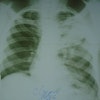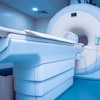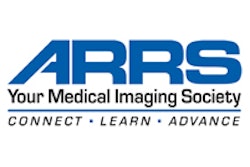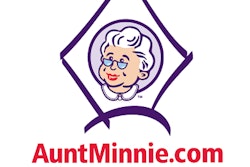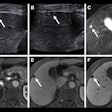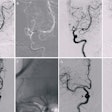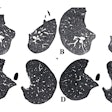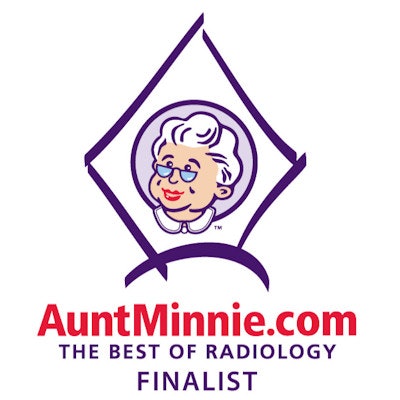
Who made it to the final round in this year's edition of the Minnies, AuntMinnie.com's event recognizing excellence in radiology? Find out who our expert panelists selected as the final candidates in this year's event.
The Minnies finalists were drawn from more than 200 candidates across 15 categories. You can also view a full list of the candidates, based on nominations from our members.
In the next round of voting, our expert panel will vote on the finalists, with winners announced in late October.
Most Influential Radiology Researcher
Dr. Judy Gichoya, Emory University
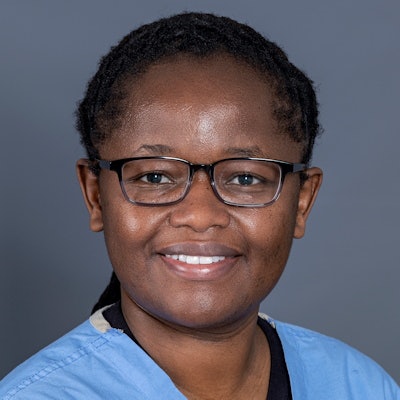 Dr. Judy Gichoya.
Dr. Judy Gichoya.An interventional radiologist by training, Dr. Judy Gichoya's research accomplishments in 2021 have ranged from studies on uterine fibroid embolization to the use of advanced wearable biomedical sensors to track different types of exercises. But her main focus in the past year has been on artificial intelligence (AI) and machine learning.
Gichoya is an assistant professor at Emory University's department of radiology and imaging sciences, having joined the institution in 2019 with a dual appointment in interventional radiology and informatics. Her research focus is on how people use technology, with a recent emphasis on how radiologists use AI and machine-learning tools.
She received her medical degree at Moi University in Kenya, following that up with a master's degree in health informatics from Indiana University-Purdue University Indianapolis. She completed her radiology residency at Indiana University and joined Emory after completing an interventional radiology fellowship at Oregon Health and Science University.
Over the past year, Gichoya has led or participated in a number of studies on AI in radiology, including as a senior author on a paper in the Journal of Digital Imaging that proposed a framework for applying machine learning to images in real-time, as well as a participating author on research for a deep-learning tool to segment and quantify breast arterial calcifications on mammograms.
Gichoya also was senior author on a paper posted to arXiv.org in July 2021 that revealed that AI algorithms could be developed to detect the racial identity of patients from their medical images. Gichoya et al posited that the phenomenon could potentially exacerbate disparities in access to medical care.
Dr. Constance Lehman, PhD, Massachusetts General Hospital
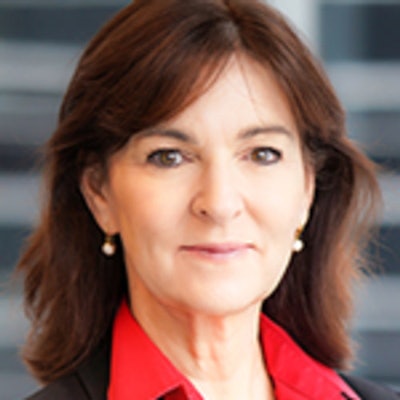 Dr. Constance Lehman, PhD.
Dr. Constance Lehman, PhD.The author or co-author of over 200 peer-reviewed publications, Dr. Constance Lehman, PhD, of Massachusetts General Hospital (MGH) has been a major figure in breast imaging research for decades, so it's no surprise that she made the cut as a finalist in this year's Minnies competition.
Lehman is a professor of radiology at Harvard Medical School, while also serving as co-director of the Avon Comprehensive Breast Evaluation Center at MGH. She serves on a number of key committees related to breast imaging, such as at the U.S. National Cancer Institute and the American College of Radiology (ACR).
Lehman has had a major impact on breast cancer screening recommendations issued by groups as diverse as the ACR, the American Cancer Society, and the National Comprehensive Cancer Network. She has also been either principal investigator or co-investigator on important research trials, such as a study that justified the use of breast MRI to scan women with breast cancer to detect malignancies in the opposite breast.
More recently, Lehman has become involved in research on the use of deep learning and AI to interpret medical images, and specifically breast images.
Earlier in 2021, she participated on the pro-AI side of a point-counterpoint debate in the pages of the American Journal of Roentgenology on whether AI would be a friend or foe to radiologists. Lehman, along with Dr. Randy Miles of MGH, took the position that AI would lay the groundwork for precision medicine while reducing healthcare costs.
At RSNA 2020, Lehman also participated as a senior author on research that found that a deep-learning algorithm performed better than the traditional Tyrer-Cuzick model for predicting cancer risk on screening mammograms.
She has also delved into research on digital breast tomosynthesis (DBT), in 2020 serving as senior author on a paper that examined whether the early benefits reported with DBT are sustained in later rounds of screening, and earlier this year, on a follow-up study in breast cancer survivors.
Most Effective Radiology Educator
Dr. Tessa Cook, PhD, University of Pennsylvania
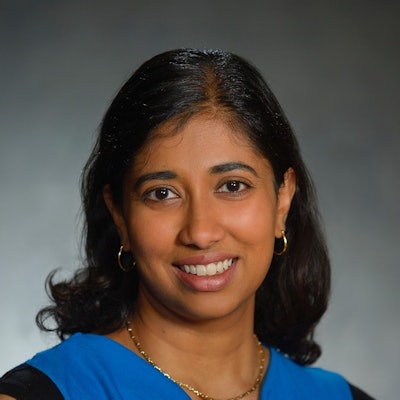 Dr. Tessa Cook, PhD.
Dr. Tessa Cook, PhD.The 2018 winner of this award, Dr. Tessa Cook, PhD, has long been drawn to explore the integration of artificial intelligence and informatics in radiology. She writes and speaks about the topics regularly, most recently contributing to research that explores how AI contributes to "precision education" in radiology, that is, curricula tailored by learning style and needs; the importance of imaging informatics in the ongoing project of incorporating AI into the field; and how AI influences radiologist trainees' experience.
Cook currently serves as assistant professor of radiology at the University of Pennsylvania in Philadelphia, where she earned her medical degree as well as a doctorate in medicine and bioengineering. Her doctorate focused on quantitative imaging processing in the Penn Image Computing and Science Laboratory under radiology professor Dr. James Gee. She also holds Master of Science and a Bachelor of Science degrees, both in biomedical engineering, from Johns Hopkins University in Baltimore.
Her clinical expertise includes cardiac CT and MRI, vascular CT and MRI angiography, thoracic and abdominal CT, and ultrasound; her research expertise includes imaging informatics, artificial intelligence, and developing streamlined radiology workflows. She is director of the university's 3D and Advanced Imaging laboratory and co-director of its Center for Practice Transformation in Radiology.
Cook is passionate about fostering patient-centered care, particularly reducing radiation dose. Case in point: In 2010, she developed a free, open-source software platform called Radiation Dose Intelligent Analytics for CT Examinations (RADIANCE) that is used around the world.
She is also involved in the development of the curriculum for the National Imaging Informatics Course -- Radiology (NIIC-RAD), a course on the fundamentals of imaging informatics designed for fourth-year radiology residents and organized by the RSNA and the Society for Imaging Informatics in Medicine. This year's course is being held September 27 to October 1.
Dr. Christine "Cooky" Menias, Mayo Clinic Arizona
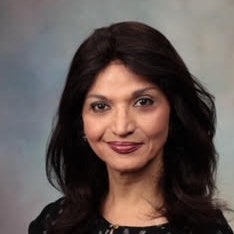 Dr. Christine Menias.
Dr. Christine Menias.In January of this year, Dr. Christine "Cooky" Menias was named editor of RSNA's RadioGraphics journal -- the first woman tapped for the post. In an inaugural editorial published January 7, Menias described a key lesson she learned as a resident that has shaped both her practice and her efforts as an educator ever since.
"During my fourth year of residency [at the George Washington University School of Medicine and Health Sciences in Washington, DC], I learned my most important career lesson when my father was diagnosed with pancreatic cancer," she wrote. "Walking alongside my father from diagnosis through treatment, I became deeply aware that behind every image there is a real patient with a real story of sickness and hardship, and that every patient and their family deserve the best care I can offer."
Menias has carried this perspective throughout her career, and her skills as an educator have not gone unnoticed: In 2020, she was honored as Educator of the Year for Research by the Mayo Clinic Arizona Resident and Fellows' Association, and in 2019, as Distinguished Educator by the American Roentgen Ray Society (ARRS). In 2018 she received the RSNA Honored Educator award.
In addition to eight years and counting at Mayo Clinic as a professor of radiology, Menias has served 25 years at Washington University School of Medicine in St. Louis as an adjunct professor of radiology. Her specialties include abdominal imaging, body CT and MRI, ultrasound, and emergency radiology. Menias is currently chair of the RSNA's Education Exhibits committee, as well as the Society of Abdominal Radiology's Education Web committee.
Most Effective Radiologic Sciences Educator
Sharon Mohammed, Memorial Sloan Kettering Cancer Center
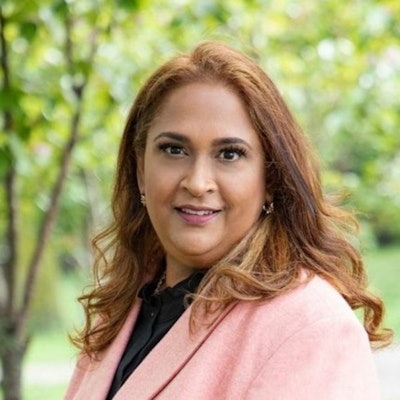 Sharon Mohammed.
Sharon Mohammed.Sharon Mohammed may be relatively new to her position as advanced imaging specialist in CT at Memorial Sloan Kettering Cancer Center in New York City -- she started in July -- but she's definitely not new to the modality: After earning her diagnostic radiologic technologist license from Bellevue Hospital School of Radiologic Technology, she served for almost two decades as a lead CT technologist at NYU Langone Health, where she regularly offered continuing education for technical staff.
Mohammed shares her knowledge and expertise not only in the classroom but also through an active writing life. This year, she has written more than 10 articles on topics ranging from team building among technologists, radiologic technologists' role in imaging patients vaccinated for COVID-19, and ways to prevent pandemic burnout, to boosting technologist education and the use of TikTok for radiology content.
And her efforts have been noticed: This summer, Mohammed was featured on the cover of ASRT Scanner, published by the American Society of Radiologic Technologists (ASRT), in a profile that recognized her accomplishments as a radiologic sciences educator.
In addition to her service at Memorial Sloan Kettering, Mohammed is also an international fellow with RAD-Aid, an organization that supports underserved areas around the world with radiology education and equipment.
Lior Molvin, Duke University
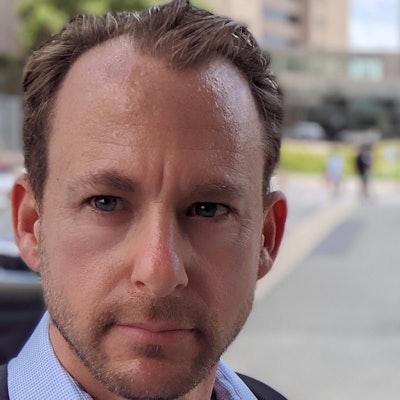 Lior Molvin.
Lior Molvin.Lior Molvin began his radiologic technologist career at Stanford University in 2006, serving there for almost 15 years as imaging services manager for CT and as radiologic technologist coordinator for CT protocols and educational development before accepting an imaging manager position this past spring at Duke University.
In addition to his radiologic technologist license, Molvin holds a Bachelor of Arts in healthcare administration and a Master of Business Administration in information technology. In 2013, he was honored as Stanford's Technologist of the Year, and for six years, he served as vice president for technologists with the International Society for Computed Tomography.
He has spoken at industry conferences around the U.S. on topics such as cardiac CT best practices, medication administration systems in radiology, saline use in CT, and electrocardiography editing of cardiac CT, and he has contributed to research published in a range of journals, including the Journal of the American College of Radiology, Radiologic Clinics of North America, Pediatric Radiology, and Investigative Radiology.
Molvin takes particular interest in effective management of CT radiation dose, developing CT workflows and protocols -- both inpatient and outpatient -- and supporting technologists' education and professional development.
Most Effective Radiology Administrator/Manager
Bradley Clemente, Montefiore Health System
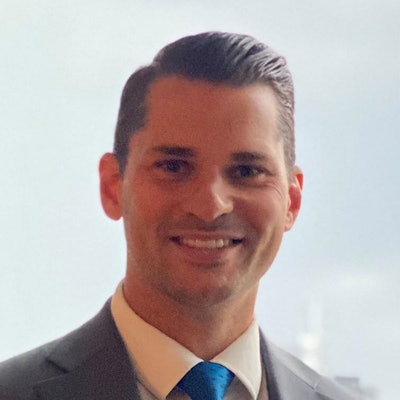 Bradley Clemente.
Bradley Clemente.Bradley Clemente was tapped as administrator for the Montefiore radiology department in 2018; he serves under department chair Dr. Judy Yee. Before joining Montefiore, he was heart and vascular service line director at Stamford Health in Connecticut and operations administrator and ambulatory services manager in the cardiology division at Johns Hopkins in Baltimore.
Clemente holds a master's degree in health services administration from Xavier University in Cincinnati, and he also currently serves as chair for the Red Cross Young Professional board and the American Heart Association Young Hearts board.
In July of this year, Clemente was part of a team led by Yee that shared lessons Montefiore's radiology department learned during the peak of the COVID-19 pandemic. Their insights were published in Current Problems in Diagnostic Radiology and included a primer on how to establish a postpandemic planning task force, particularly to control infection and manage personal protective equipment resources.
Patricia Richards, Mayo Clinic Arizona
 Patricia Richards.
Patricia Richards.Since 2018, Patricia Richards has been the coordinator for Mayo Clinic Arizona's radiology residency program, which trains 16 freshly minted physicians to be radiologists each year and boasts a 100% American Board of Radiology Core Exam pass rate.
Before her arrival at the Mayo Clinic, Richards served as coordinator for the orthopedic surgery residency and hand surgery fellowship at Banner - University Medical Center, also in Phoenix.
Richards honed her administrative and management skills during more than two decades of experience as a bank fraud investigator for JPMorgan Chase and a corporate litigation paralegal for Perkins Coie Brown and Bain -- work that also requires close attention to detail and an ability to juggle a variety of tasks.
She holds a bachelor's degree in justice studies from Arizona State University and a master's degree in organizational management from the University of Phoenix.
